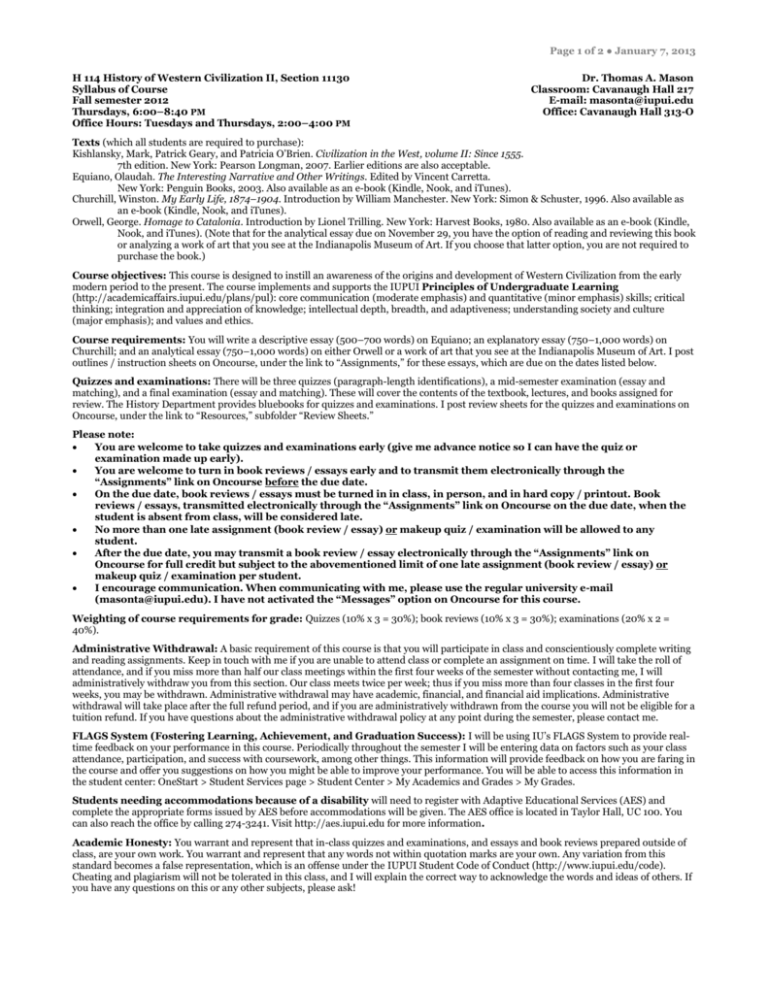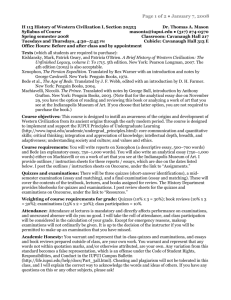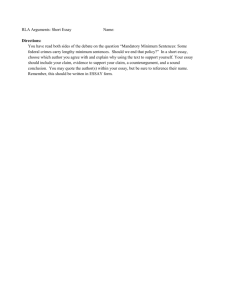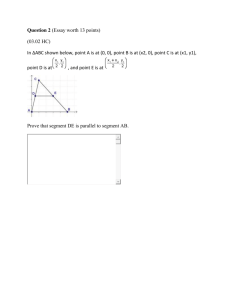
Page 1 of 2 ● January 7, 2013
H 114 History of Western Civilization II, Section 11130
Syllabus of Course
Fall semester 2012
Thursdays, 6:00–8:40 PM
Office Hours: Tuesdays and Thursdays, 2:00–4:00 PM
Dr. Thomas A. Mason
Classroom: Cavanaugh Hall 217
E-mail: masonta@iupui.edu
Office: Cavanaugh Hall 313-O
Texts (which all students are required to purchase):
Kishlansky, Mark, Patrick Geary, and Patricia O’Brien. Civilization in the West, volume II: Since 1555.
7th edition. New York: Pearson Longman, 2007. Earlier editions are also acceptable.
Equiano, Olaudah. The Interesting Narrative and Other Writings. Edited by Vincent Carretta.
New York: Penguin Books, 2003. Also available as an e-book (Kindle, Nook, and iTunes).
Churchill, Winston. My Early Life, 1874–1904. Introduction by William Manchester. New York: Simon & Schuster, 1996. Also available as
an e-book (Kindle, Nook, and iTunes).
Orwell, George. Homage to Catalonia. Introduction by Lionel Trilling. New York: Harvest Books, 1980. Also available as an e-book (Kindle,
Nook, and iTunes). (Note that for the analytical essay due on November 29, you have the option of reading and reviewing this book
or analyzing a work of art that you see at the Indianapolis Museum of Art. If you choose that latter option, you are not required to
purchase the book.)
Course objectives: This course is designed to instill an awareness of the origins and development of Western Civilization from the early
modern period to the present. The course implements and supports the IUPUI Principles of Undergraduate Learning
(http://academicaffairs.iupui.edu/plans/pul): core communication (moderate emphasis) and quantitative (minor emphasis) skills; critical
thinking; integration and appreciation of knowledge; intellectual depth, breadth, and adaptiveness; understanding society and culture
(major emphasis); and values and ethics.
Course requirements: You will write a descriptive essay (500–700 words) on Equiano; an explanatory essay (750–1,000 words) on
Churchill; and an analytical essay (750–1,000 words) on either Orwell or a work of art that you see at the Indianapolis Museum of Art. I post
outlines / instruction sheets on Oncourse, under the link to “Assignments,” for these essays, which are due on the dates listed below.
Quizzes and examinations: There will be three quizzes (paragraph-length identifications), a mid-semester examination (essay and
matching), and a final examination (essay and matching). These will cover the contents of the textbook, lectures, and books assigned for
review. The History Department provides bluebooks for quizzes and examinations. I post review sheets for the quizzes and examinations on
Oncourse, under the link to “Resources,” subfolder “Review Sheets.”
Please note:
You are welcome to take quizzes and examinations early (give me advance notice so I can have the quiz or
examination made up early).
You are welcome to turn in book reviews / essays early and to transmit them electronically through the
“Assignments” link on Oncourse before the due date.
On the due date, book reviews / essays must be turned in in class, in person, and in hard copy / printout. Book
reviews / essays, transmitted electronically through the “Assignments” link on Oncourse on the due date, when the
student is absent from class, will be considered late.
No more than one late assignment (book review / essay) or makeup quiz / examination will be allowed to any
student.
After the due date, you may transmit a book review / essay electronically through the “Assignments” link on
Oncourse for full credit but subject to the abovementioned limit of one late assignment (book review / essay) or
makeup quiz / examination per student.
I encourage communication. When communicating with me, please use the regular university e-mail
(masonta@iupui.edu). I have not activated the “Messages” option on Oncourse for this course.
Weighting of course requirements for grade: Quizzes (10% x 3 = 30%); book reviews (10% x 3 = 30%); examinations (20% x 2 =
40%).
Administrative Withdrawal: A basic requirement of this course is that you will participate in class and conscientiously complete writing
and reading assignments. Keep in touch with me if you are unable to attend class or complete an assignment on time. I will take the roll of
attendance, and if you miss more than half our class meetings within the first four weeks of the semester without contacting me, I will
administratively withdraw you from this section. Our class meets twice per week; thus if you miss more than four classes in the first four
weeks, you may be withdrawn. Administrative withdrawal may have academic, financial, and financial aid implications. Administrative
withdrawal will take place after the full refund period, and if you are administratively withdrawn from the course you will not be eligible for a
tuition refund. If you have questions about the administrative withdrawal policy at any point during the semester, please contact me.
FLAGS System (Fostering Learning, Achievement, and Graduation Success): I will be using IU’s FLAGS System to provide realtime feedback on your performance in this course. Periodically throughout the semester I will be entering data on factors such as your class
attendance, participation, and success with coursework, among other things. This information will provide feedback on how you are faring in
the course and offer you suggestions on how you might be able to improve your performance. You will be able to access this information in
the student center: OneStart > Student Services page > Student Center > My Academics and Grades > My Grades.
Students needing accommodations because of a disability will need to register with Adaptive Educational Services (AES) and
complete the appropriate forms issued by AES before accommodations will be given. The AES office is located in Taylor Hall, UC 100. You
can also reach the office by calling 274-3241. Visit http://aes.iupui.edu for more information.
Academic Honesty: You warrant and represent that in-class quizzes and examinations, and essays and book reviews prepared outside of
class, are your own work. You warrant and represent that any words not within quotation marks are your own. Any variation from this
standard becomes a false representation, which is an offense under the IUPUI Student Code of Conduct (http://www.iupui.edu/code).
Cheating and plagiarism will not be tolerated in this class, and I will explain the correct way to acknowledge the words and ideas of others. If
you have any questions on this or any other subjects, please ask!
Page 2 of 2 ● January 7, 2013
H 114 History of Western Civilization II, Section 11130
Date
January
Lecture topics (approximate)
10
17
24
31
February
7
14
21
28
March
7
14
21
28
April
4
11
18
May
28
2
Remember:
Dr. Thomas A. Mason
Textbook (Kishlansky et al.) Chapter
Introduction. What is a civilization? Ancients and Moderns;
Legacies of ancient and medieval civilizations; Renaissance and Reformations
The French Wars of Religion, the Revolt of the Netherlands, and the Thirty Years War 14
Economy and Society in Early Modern Europe
15
Absolutism and Resistance
16
Quiz 1 (covers chapters 14–15)
The Scientific Revolution, Mercantilism, and Colonialism
17
The World of Olaudah Equiano
Descriptive essay (review of Equiano) due
Eighteenth-Century Geopolitics, Balance of Power, and State-Building
18
The Enlightenment
19
The French Revolution and Napoléon
20
Quiz 2 (covers chapters 16–19)
The Industrial Revolution
21
Nineteenth-century Reform, Revolutions, and the Balance of Power
22
Nineteenth-century Unification and State-Building
23
Mid-semester Examination (covers chapters 20–22)
Spring Break. Please celebrate responsibly!
Fin-de-siècle Europe
24
Imperialism, Geopolitics, and the Balance of Power Redivivus
25
The World of Winston Churchill
Explanatory essay (review of Churchill) due
Democracies, the Great War, Communism, and Fascism
26–27
Visit to the Indianapolis Museum of Art, 4000 Michigan Road.
Meet inside the main entrance.
The World of George Orwell
Quiz 3 (covers chapters 23–27)
Analytical essay (review of Orwell or analysis of work of art) due
World War II
28
Wars Hot and Cold
29–30
Final Examination, 6:00–8:00 PM (covers chapters 28–30).
Note that day and time (set by the University Registrar) of the exam are the
same as our normal class schedule.
Location is our usual room, Cavanaugh Hall 217.
“The past isn’t dead; it isn’t even past.”
—William Faulkner, Requiem for a Nun (1951)
“The past is a foreign country: they do things differently there.”
—L. P. Hartley, The Go-Between (1953)
“We contend, however, that war is nothing more than a continuation of politics with the
mixing in of other means.”
—Carl von Clausewitz, On War (1832)
Reporter: “What do you think of western civilization?”
Mohandas Gandhi: “I think it would be a good idea.” (1931)
“Study history. Study history. In history are all the secrets of statecraft.”
—Winston Churchill, The Age of Revolution (1957)
“‘Who controls the past,’ ran the Party slogan, ‘controls the future; who controls the
present controls the past.’”
—George Orwell, Nineteen Eighty-Four (1949)
“Don't confuse me with the facts. I've got a closed mind.”
—Earl F. Landgrebe, Indiana Congressman (1973)
“The supposed ‘clash of cultures’ is in reality nothing more than a manifestation of
mutual ignorance.”
—The Aga Khan, Spirit & Life: Masterpieces of Islamic Art from the Aga Khan Museum
Collection (2007)










